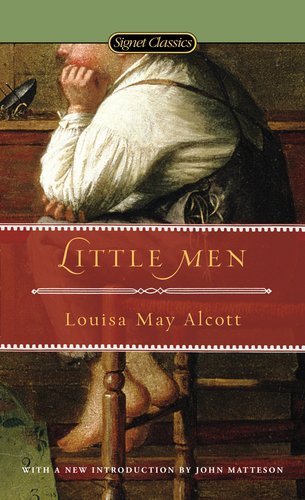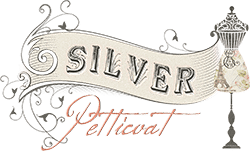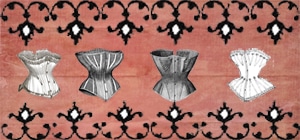
Author: Louisa May Alcott
Vintage Book: Little Men
Website: http://www.louisamayalcott.org/
SYNOPSIS
“At Plumfield, an experimental school for boys, the little scholars can do very much as they please, even slide down banisters. For this is what writer Jo Bhaer, once Jo March of Little Women, always wanted: a house “swarming with boys…in all stages of…effervescence.” At the end of Little Women, Jo inherited the Plumfield estate from her diamond-in-the-rough Aunt March. Now she and her husband, Professor Bhaer, provide their irrepressible charges with a very different sort of education—and much love. In fact, Jo confesses, she hardly knows “which I like best, writing or boys.” Here is the story of the ragged orphan Nat, spoiled Stuffy, wild Dan, and all the other lively inhabitants of Plumfield, whose adventures have captivated generations of readers.”
LITTLE MEN REVIEW
I know many of us have read Little Women, grown up with Jo March and her wonderful sisters and their lovable mother Marmee. I know I couldn’t have been the only one who was inspired by Jo and wished to become a writer just like her in Little Women, but what then about Little Men or Jo’s Boys for that matter? For many years, I must honestly admit that ever since I first read Little Women (and seen the movies), I have refused to read its’ two sequels out of principle. Jo should have either been with Laurie or single of course and not with some old boring professor who convinces her that sensational writing is inappropriate. I either wanted another Anne and Gilbert ending of which I felt I had been robbed of, or at least one similar to Alcott’s own life in which she sticks with a life of independence. Still, despite my lifelong hesitations, I finally sat down and started to read Little Men (thanks to it being on the syllabus of my History of American Children’s Literature class) with a semi-open mind. I started to read about Nat, Demi, Tommy, and the other boys at Plumfield with interest. Not too far into the novel, however, a new, surprising thought entered my head. Who was this Mrs. Bhaer (her married name)? It was like I no longer knew the Jo of my childhood. She was gone. She, like her boys, had been civilized and tamed into what a proper woman should be. Jo March was no more.
Throughout the novel, Alcott compares her boys (and girls) “with animals to reveal their ‘true’ nature,” natures they must learn to be controlled in a civilized society (92). In fact, it surprises me to find that Jo’s presence was not a continuation of Little Women. She had been placed in the role of “Mother Bhaer” to a house full of mostly boys and became background decoration (11). There is no more spirit or spunk. Jo March had become the perfect domestic ideal, taking care of her “home” with “motherly care” (16). She takes in orphan boys and poor boys to teach them how to be useful in society, how to first accept their animal natures before being tamed by Jo and her husband. Everything in this world at Plumfield is lovely, ideal and wonderful and part of me does get drawn into the perfect picture of domesticity. Still, what happened to Jo? Is she happy or just useful as the ultimate mother figure? She acts satisfied with her life but why isn’t she writing anymore, excepting for her “conscience book” that she writes about each of the children (33)? I WILL concede that Alcott does more with Jo as a writer in Jo’s Boys at least (though the entire novel feels like an afterthought that Alcott throws out the window at the end and practically says good riddance to the whole thing).
When Jo sat down in Little Women to write her novel, I felt inspired but was that to be her sole ‘type’ of writing? Perhaps Jo can only civilize her boys because she too has been tamed into the role society thought she needed to be. It was wrong for Jo to be ambitious. She needed to accept her domestic role before she could find true joy of course. She had to put off the natural independent spirit because that life would have been lonely.
It was like I no longer knew the Jo of my childhood. She was gone. She, like her boys, had been civilized and tamed into what a proper woman should be. Jo March was no more.
The loss of this youthful spirit is certainly emphasized over and over again in Little Men as a good thing. For instance, Nan the wild girl who stays at Plumfield School is often compared to the old Jo. When telling Fritz why Jo wants Nan to come and stay she confesses, “I feel a great sympathy for Nan, because I was such a naughty child myself that I know all about it. She is full of spirits, and only needs to be taught what to do with them to be as nice a little girl as Daisy” (102). So, must these “spirits” be suppressed in order for Nan to no longer be considered naughty? Jo noticeably wants Nan to be tamed, to lose the wild spirit that she too once held close. Psychological training begins to tame Nan just as Jo had once been tamed by her own mother (for her horrible temper in Little Women).
In comparison, the taming of Nan reminds me of the chapter about Dan (another of the boys) taming the wild horse. By the end of that chapter, Dan succeeds in taming it. He says, “See, he won’t run away now, even if I don’t hold him, and he comes to me the minute I whistle. I have tamed him well, haven’t I” (250)? Jo merely replies back, “I am taming a colt too, and I think I shall succeed as well as you if I am as patient and persevering” (250). While here the focus may be on the taming of Dan, I find that the real taming of the novel is Jo March. She comes when there is a whistle, not from her husband but from her duty to play the role of a typical domestic wife. She has even given up tree climbing “since [she] was married” (235). She also spends a good portion of the novel teaching Daisy to cook and to be a proper woman, something that she also wants for Nan. Furthermore, while Fritz (her husband) seems to do the actual teaching at the school, Jo mainly teaches morality. The gender roles here are evident.
In Little Men, when the Bhaers take in orphans and misbehaved children, it is a wonderful and a positive thing so don’t get me wrong ; I still LOVE this novel and the lifelike characters in it, despite my major misgivings of the female characterization that was once so rich in Alcott’s first book about the March sisters. Plumfield does do a world of good for the children so desperately in need of love and discipline, particularly with Nat, Dan, and Nan. I can even recognize that her marriage to Fritz is a good marriage because it is an equal and an affectionate one (maybe even too perfect). Nevertheless, something about it still rubs me the wrong way. I think it has to do with why I am so bothered with Jo’s loss of spirit. The few scenes she had with Laurie, I felt like I could once again see glimpses of the real Jo. I cannot help but feel like Laurie represents a life she could have had; a life where she could not only keep her spirit but one where she could also be a mother. With Nat, it is almost like they are raising this particular child together. Laurie is the one who sent him to her and will take him back when he is ready. Laurie even promises to send his biological daughter Bessie to Jo when she is old enough to attend Plumfield. Would life have been so tempestuous if they had been married like Little Women suggests? I don’t think so but then again maybe Jo had to marry Fritz or else Jo could not play the ideal feminine role in a sentimental novel. Perhaps this has to be Jo’s only purpose in life because that is Alcott’s role as a writer of domestic fiction: to teach young children the proper way to behave, to tame her audiences. Not to mention that a marriage full of spirit would only stray from this feminine and mother figure ideal. Certainly, any echo of ambition seems to have been lost in the wind in Little Men that does thankfully get rectified in Jo’s Boys.
At the end of the novel, Jo asks Laurie not to “pity” her with true sincerity because of the life she had ended up with (326). But I do pity her. Not because she is a mother (of which I have no problem with at all) but because she had to become a mother that has lost her spirit (something she conceives as being naughty or bad or wild). She is the colt that has been tamed. Little Men is a disappointment to me not only because I had to read a whole novel of her married to the Professor (who I readily admit I despised in Little Women because of how he stamps out Jo’s spirit) but because I had to read a whole novel about a character that I grew up loving become nothing but a shadow of her former and I find superior self. Superior not because being wilder is better but superior because in Little Women, Jo March felt real.
Overall Impression
While not nearly as magical as Little Women, Alcott still knows how to spin a domestic tale with perfect ease and is still a true classic in every sense of the word. If you loved the March sisters, there is a good chance you will love the boys and girls at Plumfield almost as much. There are definitely some tearjerkers in this one as well but for those who still haven’t read it, I won’t spoil the surprises in store.
Adaptation Recommendation
I would love to see someone turn Alcott’s trilogy of books into films rather than just the first one. Maybe a mini-series in 3 parts would be a great idea, like a BBC production but in America. It would truly be fascinating.
Overall Rating
“Hello Gorgeous.”
Romance Rating
“I have not the pleasure of
understanding you.”
Page Count: 368 pages
Genre: Literary Fiction, Domestic Fiction, Classic Literature, Children’s Literature
Publisher: Signet Classics
Buy this copy at:
OR read it for free on your Kindle:
Do you agree with my take on Little Men or do you think I am completely off base? Sound off below…
Alcott, Louisa May. Little Men. New York: Signet Classics, 2012. Print.
RELATED:
Read our guide on 50 Memorable Christmas Movies including Little Women!
Didn’t like an ending to a book? Check out our Twenty Moments in Fiction You Wish You Could Rewrite
ARE YOU A ROMANCE FAN? FOLLOW THE SILVER PETTICOAT REVIEW:
 Our romance-themed entertainment site is on a mission to help you find the best period dramas, romance movies, TV shows, and books. Other topics include Jane Austen, Classic Hollywood, TV Couples, Fairy Tales, Romantic Living, Romanticism, and more. We’re damsels not in distress fighting for the all-new optimistic Romantic Revolution. Join us and subscribe. For more information, see our About, Old-Fashioned Romance 101, Modern Romanticism 101, and Romantic Living 101.
Our romance-themed entertainment site is on a mission to help you find the best period dramas, romance movies, TV shows, and books. Other topics include Jane Austen, Classic Hollywood, TV Couples, Fairy Tales, Romantic Living, Romanticism, and more. We’re damsels not in distress fighting for the all-new optimistic Romantic Revolution. Join us and subscribe. For more information, see our About, Old-Fashioned Romance 101, Modern Romanticism 101, and Romantic Living 101.


